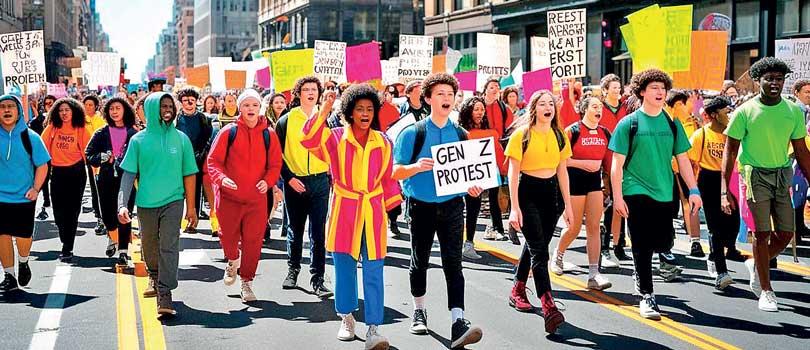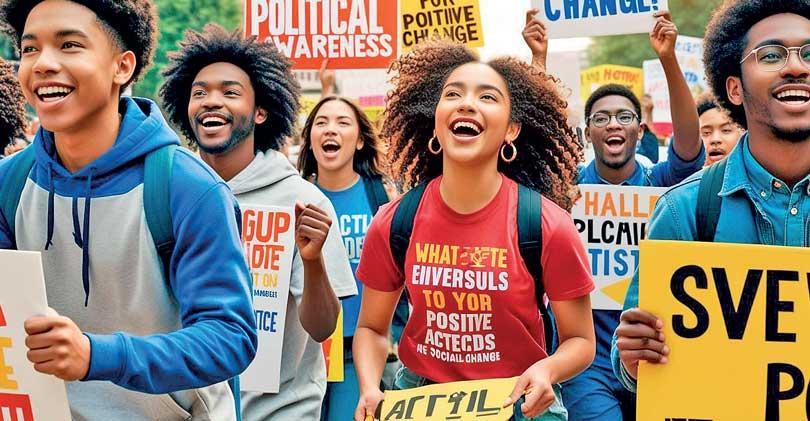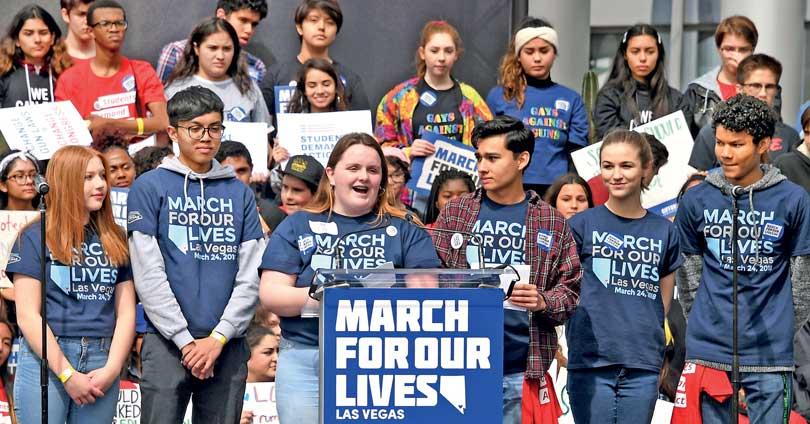


This generation has made it clear: they are not waiting for permission to lead.
|
Maxwell Frost |
In the past decade, Generation Z, those born between 1997 and 2012, has emerged as a formidable political force. From climate change protests to digital activism, this generation is redefining political engagement, challenging traditional institutions, and influencing global policies. Unlike previous generations, Gen Z is using technology, social media, and grassroots organizing to mobilize and demand change on critical issues. Their activism is not just about raising awareness; it’s about driving tangible political action, from influencing elections to shaping legislative decisions.
The Rise of Gen Z Activism
Gen Z has grown up in an era defined by political turmoil, economic uncertainty, and rapid technological advancements. From school shootings in the U.S. to the climate crisis, these young people have witnessed the failures of previous generations to address systemic issues. Their response has been to take matters into their own hands, using every tool available; protests, digital platforms, and even running for office. One of the most defining characteristics of Gen Z activism is its intersectionality. Unlike previous movements that often focused on single-issue advocacy, Gen Z activists recognize the interconnectedness of social, economic, and environmental justice. They champion causes like racial equality, LGBTQ+ rights, gender equity, and climate justice as part of a broader movement toward systemic change.
The Future of Gen Z’s Political Impact
Looking ahead, Gen Z’s influence on politics will only grow. As more of them reach voting age and enter the workforce, their economic and political power will expand. Some are already running for office, figures like Maxwell Frost, the first Gen Z member of the U.S. Congress, signal a new era of youth leadership. As climate change, economic instability, and social justice remain pressing global concerns, Gen Z will continue to challenge traditional power structures. Their activism, whether through protests, policy advocacy, or online mobilization, is reshaping the political landscape and setting the stage for a more engaged, progressive future. This generation has made it clear: they are not waiting for permission to lead. They are demanding change now, and they have the tools, the numbers, and the determination to make it happen.
Social Media: The Engine of Political Mobilization
Gen Z’s political awakening is deeply intertwined with social media. Platforms like TikTok, Instagram, and X have become not only spaces for entertainment but also powerful tools for activism. Unlike previous generations who relied on traditional media, Gen Z gets its news from influencers, independent journalists, and activist accounts. During the Black Lives Matter (BLM) protests in 2020, Gen Z played a crucial role in organizing demonstrations, sharing information about police brutality, and raising funds for social justice causes. Hashtags like #JusticeForGeorgeFloyd and #BlackLivesMatter went viral, leading to global protests and legislative discussions on police reform. Similarly, TikTok users disrupted former President Donald Trump’s 2020 rally in Tulsa, Oklahoma, by reserving thousands of tickets and then not showing up, leaving the venue half-empty. This digital prank highlighted how Gen Z leverages social media for direct political action.
Challenges and Backlash
Despite their growing influence, Gen Z activists face significant challenges. Many are dismissed as “too young” or “too radical” by political leaders. Conservative critics argue that their activism is performative or driven by social media trends rather than genuine political engagement. Additionally, online activism, often referred to as “slacktivism” raises concerns about whether digital efforts translate into real-world change. While social media is a powerful tool, some critics argue that liking, sharing, or commenting on a post is not enough to bring about systemic reform. Furthermore, many Gen Z activists experience online harassment and threats, particularly young women, and activists from marginalized backgrounds. This digital hostility can have real-world consequences, including mental health struggles and burnout.
Gen Z and Policy Influence
Beyond voting, Gen Z activists are directly influencing policies at local, national, and international levels. Climate change is a prime example. Figures like Greta Thunberg have brought the climate crisis to the forefront of global politics, pressuring governments to adopt more aggressive environmental policies. The youth-led Fridays for Future movement has staged massive protests worldwide, urging lawmakers to take urgent action against global warming. In the U.S., young activists have pushed for gun reform. After the 2018 school shooting in Parkland, Florida, survivors founded March For Our Lives, advocating for stricter gun control laws. Their activism has led to legislative victories, including new gun safety laws in several states. In the corporate world, Gen Z is also demanding accountability. Young people are pressuring brands to align with social justice values, calling out corporations for unethical practices, and even influencing marketing strategies. Companies that fail to address issues like sustainability and diversity risk losing the support of Gen Z consumers.
The Youth Vote: A Game-Changer in Elections
Historically, young voter turnout has been lower than that of older generations, but Gen Z is changing that trend. In the 2020 U.S. presidential election, youth voter turnout (ages 18–29) was the highest it had been in decades, with around 50% participation. This surge helped propel Joe Biden to victory, particularly in swing states like Georgia and Arizona. In Brazil, young people were instrumental in mobilizing against Jair Bolsonaro’s presidency, leading to his defeat by Luiz Inácio Lula da Silva in 2022. Organizations like Gen Z for Change and March For Our Lives are working to ensure that youth turnout remains high. These groups educate young voters about policies, simplify voter registration, and push back against voter suppression tactics that disproportionately affect marginalized communities.












